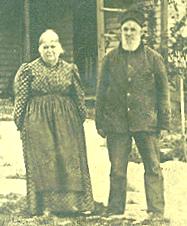Captain George DeWitt
Assistant Surgeon

DeWitt on his son's farm
shortly before his death

George Seabury DeWitt was born 6 Feb 1818, in New York City, where his father, Thomas Witt, and mother, Elizabeth (Newhall) Witt, resided. His given name was Seabury Treadwell Witt. At street level of the building in which the Witt's lived was the Thomas Witt Shoe Store. The family had moved to New York from Lynn, Massachusetts, an area in which the Witt's had lived since 1650. The Witt family returned from New York to Lynn in 1831.
Dr. DeWitt and his brother, John Franklin Witt were raised as shoe and dress boot makers like their father, a shoe merchant. George Seabury decided, in 1844, that he did not want to be a "cobbler" for all his life. Already tutored in Latin and Greek, he was accepted by the Harvard Medical School as Seabury Treadwell Witt. He made "Fine Dress Shoes for Fine Gentlemen" to finance his education, supplemented by janitor work for a pharmacy, where he also had a sleeping and work space.
Taunted by being called "Seabury Tread-On No-Witt," he had his name legally changed to George Seabury DeWitt. He received his medical school diploma from Harvard in 1844, and worked as a medical assistant to Dr. Horatio Newhall, a cousin, in Galena, Illinois, until 1846, when he moved to a St. Croix, Wisconsin, lumber camp, where he served as the camp physician.
In 1848-49, he left Wisconsin with his savings to relocate and establish his practice elsewhere. By the time he reached Dubuque, Iowa, he no longer had any money, having met up with two Professional River Boat gamblers along the way. Penniless, he set out walking southwest, looking for a community in need of a physician. By June of 1850, he had reached Colesburg, Iowa. Aoon after, he purchased a lot on which he erected his office and started his practice anew.
In 1851, the John Stanclift Jr. family had migrated to Colesburg from Concord-North Collins, New York. Dr. DeWitt treated John Stanclift Jr's daughter, Sarah Eliza, and subsequently courted and married her in 1852. Sarah's grandfather, Amasa Smith, had served as a soldier in the War of 1812.
Dr. DeWitt volunteered for duty in the Civil War and was commissioned a Captain, 2nd Assistant Surgeon, Fifth Iowa Cavalry, in February of 1863. Shortly after his commission, he was attached to a Pennsylvania Cavalry Scouting Party for a period and was at times the only surgeon at battlefield hospital stations. On one day, he performed twenty operations.
Dr. DeWitt suffered an injury and was a patient near Murfreesboro when he was forced to resign his commission. He was discharged 20 Feb 1864.
After the Civil War, Dr. DeWitt performed no more operations. In a letter to Harvard University, he said that he had become "too nervous a man" to perform under the stress of surgery. He then moved his family by covered wagon to Elliott, Iowa, in 1868, and lived near his sons.
During his retirement, Dr. DeWitt's chief activities were walking to Elliott to get the Chicago Newspaper, re-reading the classics, and letter writing. His correspondence was voluminous over a thirty year period, including letters to the government, in an attempt to be reimbursed $40.00 for an Army overcoat which was "stolen" at a field hospital during the war. His letters emphasized reimbursement "with interest" underlined twice. Finally, around 1900, he received an invalid's pension from the government. Dr. DeWitt died July 6, 1910.
This tribute is provided by Lieutenant Curtis DeWitt (USN), proud great-great-great-grandson of the Fifth Iowa Cavalry's Assistant Surgeon.

Return to the Fifth Iowa Cavalry Personnel
Return to the History of the Fifth Iowa Cavalry